In our twelfth edition of the Donut Dollie Detail, Sharon (Vander Ven) Cummings tells about visiting wounded soldiers was hard, yet rewarding, having Christmas dinner with the guys in Vietnam, and her experiences of meeting veterans at the Vietnam Veterans Memorial and the thank you’s she received while marching in a veterans parade.
Please share the Donut Dollie Detail with family, friends and veterans you may know, and make sure to like/follow us on Facebook to learn when the next edition is posted. You can also share your email address with us at list@donutdollies.com for updates on the upcoming release of the Donut Dollies Documentary (we will not share/sell your email and will only use it for Donut Dollie related updates).
Please meet Red Cross Donut Dollie Sharon (Vander Ven) Cummings…
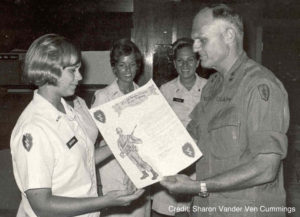 What prompted you to join the SRAO (Supplemental Recreation Activities Overseas) and want to go to Vietnam?
What prompted you to join the SRAO (Supplemental Recreation Activities Overseas) and want to go to Vietnam?
Most of us were recruited from college campuses. Requirements were for young women, minimum age of 21, single, with a college degree. In my case, my Mom worked for the Red Cross and told me about the jobs opening up in Vietnam. I flew to San Francisco and interviewed for the job, they asked me where I would rather go, Korea or Vietnam. I chose Vietnam – it was 1966 and I figured not many people would volunteer to go there. Within 6 weeks, I had gotten my shots and was in Washington, DC for two weeks of training. Our training consisted of learning how to recognize the various branches of the military and their ranks, and how to behave like a lady in all situations.
When I went to Vietnam, I was the youngest girl in-country. I look back and cannot believe how innocent and naive I was. I had been raised as an Air Force brat and lived in Germany, the Philippines, and even graduated from high school in Goose Bay, Labrador, but had really lead a very sheltered life. It was quite an experience! And knowing all I know now, if you’d ask me today, I’d go again.
When and where were you stationed in Vietnam? Did you go by a nickname?
The first six months were at Cam Ranh Bay, Army. Then with Long Binh II Field Forces (but we lived in Bien Hoa), and finally with the 25th Division in Cu Chi. I was known as Shari in Vietnam.
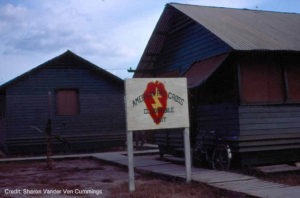 What was a routine day like in Vietnam?
What was a routine day like in Vietnam?
First, it depended on where I was stationed and whether or not our unit had a recreation center or was strictly a clubmobile unit. For me, as a Donut Dollie, my time was spent focusing on the guys — either playing pinochle, ping pong, or pool at the center; or writing & creating the next mobile program (we were each responsible for writing a program & making all the props); or spending the entire day traveling from site to site by either helicopter or jeep to the various units we’d be presenting a program to (we traveled in pairs when we programmed). The days were long. It seems to me that we probably worked 6 days a week. Those days where I’d be “off” were spent resting, maybe going into the village to go shopping or see the sites; at Cam Ranh we’d go to the beach.
We got up early every morning and got to bed late at night. We also had strict curfews, although I cannot remember what time we got locked in. And yes, we really were locked in for the night.
On four separate occasions, after arriving at a unit and setting up to do the program for that day, I had to adapt and let someone else do some real “performing.” That someone was Martha Raye. She was all over Vietnam, and for a while, it seemed she was following me wherever I went. To say the least, there was no way I would ever have tried to compete with her!
Did you ever have any “close calls” either on base or in any vehicles?
No, I didn’t have any close calls. I remember listening to “outgoing” rounds – they became part of the regular noise and we just got used to it.
Were you ever injured while in Vietnam?
No.
What was it like to visit the soldiers in the hospitals?
Sometimes it was really hard. For me, though, this was a very important part of my job and extremely rewarding. We took hospital books to break the ice. But mainly, we were there, smiling and being our cheerful selves. We had to let the guys know that we were not repulsed or shocked at how they looked — for if we could accept them the way they looked, then maybe things would be okay when they got home. I think it was very important.
How was the transition returning home to the United States?
I was physically and emotionally exhausted. I really didn’t know how to act. I would walk down a street and smile at everyone, because that was what was expected in Nam. Someone pointed out to me that I shouldn’t be smiling at everyone — it wasn’t right and people might get the wrong impression. I got very angry one day when I was in the grocery store — there was this huge long aisle of cereal boxes. It seemed like hundreds of different types of cereal. And it was more important to choose the correct brand of cereal than to think and worry about our guys who were being blown to bits on the news every night. Nobody seemed to get it that these guys were really dying and that was real blood. I got so very, very angry – – and this was in 1967. I felt lost. I didn’t know what to do next. Get another job? Nothing could compare to the excitement and fulfillment I had while working with MY guys in Vietnam. The let down was very, very hard.
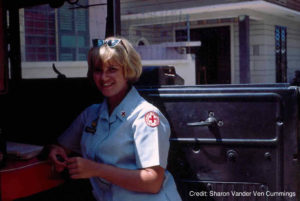 What would you like people to remember and understand most about the women who served?
What would you like people to remember and understand most about the women who served?
We were there because we wanted to be there. We were there to bring some joy and distraction into the lives of the guys… and we did it the best we knew how! We gave a lot of energy, and when we had no strength for another smile, we smiled anyway.
How do you feel Veterans think of your time having served with them? Have any Veterans expressed their feelings to you directly?
The veterans I have met at the Wall in Washington DC and at other vet events in California have been very appreciative of our work in Vietnam. The first time I participated in a vet parade, lots of the guys told us “thank you” for all we’d done. That brought me to tears. I’d never thought we did anything special, but apparently, for many of the guys, we did.
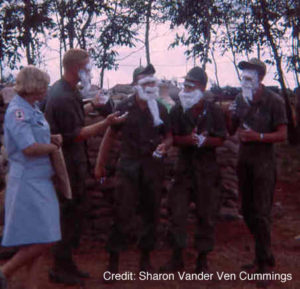 What were your fondest or most interesting memories of your time serving in Vietnam?
What were your fondest or most interesting memories of your time serving in Vietnam?
I really miss the people – I really saw the good sides of people while there. I also miss the intensity of the job and the satisfaction I got out of my job. Now, when it is time to go home, I leave the job behind and never think about it. All jobs have paled in comparison to the satisfaction I got while in Nam. There was excitement and a real challenge to being a Donut Dollie!
On Christmas day, all the girls in our unit went out to different units in the field. While there, we had Christmas dinner with the guys – when I say “the guys,” I do not mean the officers. We almost always worked with the enlisted men (boys). I was out at a forward location, so we ate in mess tents that had been set up. Later, several helicopters took us to Cu Chi where we got to see the Bob Hope show. It was quite a day!
I made two lasting female friendships from Vietnam. The first was with a girl I trained with in Washington DC and then was stationed with during my first 6 months in country. The second friendship was rekindled at the Vietnam Women’s Memorial dedication in Washington, DC (1993) with a woman who had been my unit director at my first assignment. The other friendships were more temporary. Male friendships were also temporary and based on where I was assigned. Since 1993, I have made new friendships with women who also served. It has been a wonderful learning and healing experience.
PLEASE NOTE: THERE ARE 11 PREVIOUS EDITIONS OF THE DONUT DOLLIE DETAIL THAT CAN BE SEEN HERE, JUST SCROLL DOWN TO READ EACH (AT THE BOTTOM, YOU’LL SEE A LINK TO GO TO THE NEXT PAGE OF DONUT DOLLIE DETAIL FEATURES)
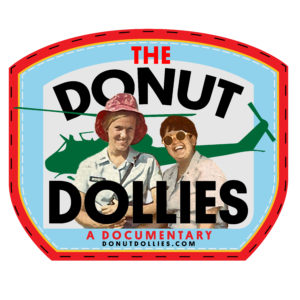
Shari, TYFYS. You are a part of our brotherhood, sister..Thank you for what happiness you brought to us.
Thank you so much for kindness and understanding. You all meant so much to us. Life in Vietnam was much more bearable. Thank you just doesn’t seem enough. I love reading your story.
We were also in Korea and served the troops at least 6 stops a day. It was a great time and we so appreciated all the men. This was early 60’s and there were not as much women in the service as there are today. My father was a field director and suggested the program to me. I will forever be grateful for the 17 months spent doing the job. No other job has meant so much to me.
I was a helicopter pilot with Headquarters II FIELD FORCE at Long Binh and lived in Honour-Smith Compound in Bien Hoa. I was there from July 1966 to July 1967. and I had the honor of knowing some of the Red Cross ladies including Linsey Stringfellow, Patricia Shalter and Phyllis Shaughnessy.
Sharon, we were together in Cam Ranh Bay. I’m Susan Harden Lynch. So good to find you again. I saw you in the movie and hoped you were ok and enjoying life. I still remember our visit in Fresno.